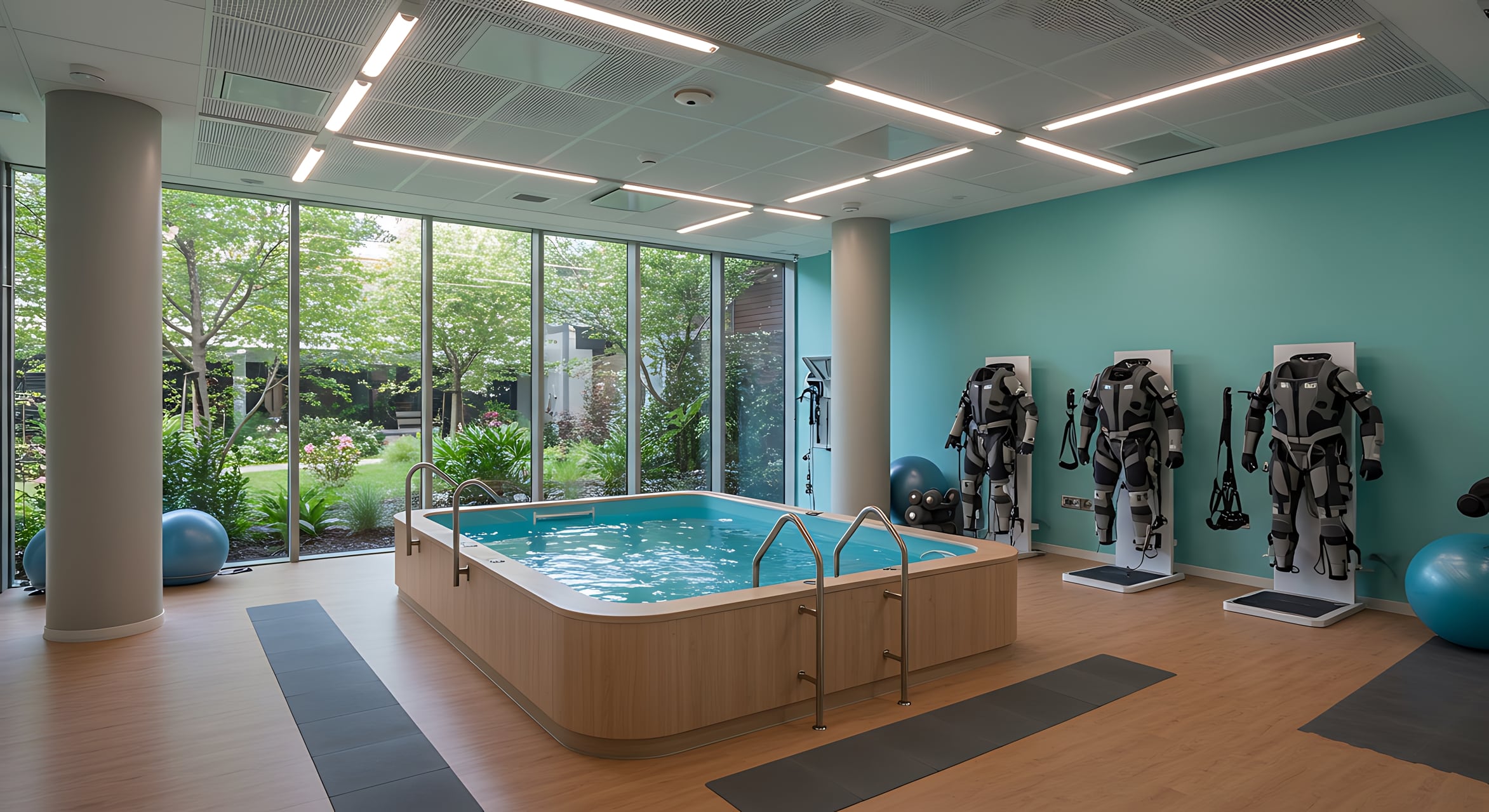Curious about the most underused mental health treatment hiding in plain sight?
Hydrotherapy techniques offer a cutting-edge way to improve mental wellness and reverse the signs of stress and anxiety. Anxiety disorders impact 275 million people across the globe, while overall mental health in the US is at a crisis point. Hydrotherapy treatment for mental health may help.
But here’s the thing…
Water-based therapy isn’t the same old talk therapy everyone else is raving about. Hydrotherapy is showing some truly remarkable results for those suffering from stress-related disorders, anxiety, and depression.
New studies confirm that the benefits of hydrotherapy reach far beyond physical rehabilitation or treatment and will leave you wondering why you haven’t heard more.
In this article, we cover:
- The Science Behind Water Therapy’s Mental Health Impact
- Revolutionary Techniques Transforming Anxiety Treatment
- How Hydrotherapy Rewires Your Brain for Better Mental Health
- Advanced Methods That Beat Traditional Approaches
- How to Create Your Personal Water-Based Wellness Plan
The Science Behind Water Therapy’s Mental Health Impact
It’s not just spa day Instagram posts claiming hydrotherapy is all it’s cracked up to be – there’s legitimate science behind the healing effects of water.
A comprehensive meta-analysis of 977 participants in 17 different studies found that hydrotherapy and balneotherapy lead to significant, measurable improvements in both anxiety and depression scores.
The average effects were:
- 46% lower anxiety scores
- 53% improvement in depression symptoms
- Consistent positive changes across a variety of treatment approaches
But there’s more good news…
Even better, these aren’t just short-term, temporary changes. Researchers have linked regular hydrotherapy sessions to long-term, permanent neurochemical changes in your brain. Immersing your body in water has a direct effect on serotonin, dopamine, and endorphin levels – all the happy chemicals that are depleted by stress, depression, and anxiety.
Think about it – when was the last time you felt anxious while taking a hot bath? There’s a reason for that, and now we know it’s more than just a feeling.
Revolutionary Techniques Transforming Anxiety Treatment
Regular old hydrotherapy treatments are out and cutting-edge, next-level water therapy is in.
Here’s what’s trending in the water-based wellness world:
- Contrast hydrotherapy – alternating between hot and cold water for neural stimulation
- Aquatic exercise programs – movement combined with hydrotherapy
- Sensory integration pools – using water pressure and temperature for anxiety relief
- Mindfulness-based aquatic therapy – meditation techniques in the water
The most effective approach is a combination of several techniques in a structured session.
For example, starting with a hot water immersion to bring down cortisol levels, followed by gentle aquatic exercises and finishing with a cool-down in colder water to increase alertness and mood.
And here’s the best part…
Participants in hydrotherapy programs notice improvements and results much faster than with most traditional approaches. Conventional psychotherapy and CBT can take months to become effective, while hydrotherapy users report significant, positive mood changes after just a few sessions.
How Hydrotherapy Rewires Your Brain for Better Mental Health
Water is fantastic for your nervous system.
The simple act of being submerged in water impacts your parasympathetic nervous system – which is your “rest and digest” response that offsets stress and anxiety responses.
This rewiring leads to:
- Improved focus and memory retention due to sensory stimulation
- Clearer, more relaxed thinking via improved blood flow to the brain
- Better emotional regulation from restored hormonal balance
- Increased neural plasticity from new sensory experiences
In a study of autism spectrum disorder in children, 87% of participants were involved in hydrotherapy treatment with reported improvements in attention difficulties, anxious and negative thought patterns, and behaviour problems.
Water’s unique multi-sensory environment forces the brain to process tactile, proprioceptive, and vestibular data simultaneously. The result is stronger neural pathways and more efficient cognitive processes.
Advanced Methods That Beat Traditional Approaches
Hydrotherapy has gone way beyond “just” taking a hot bath or long shower.
Today’s leading-edge techniques include:
Thermal Regulation Therapy
Precise temperature fluctuations to elicit certain physiological responses. Cool water between 60-70°F will stimulate alertness and energy while warm water at 98-104°F will encourage relaxation and stress relief.
Aquatic Cognitive Behavioural Therapy
Blending traditional CBT with water-based activities. The combination of techniques helps with processing emotions and developing coping skills more effectively than water therapy alone.
Hydrotherapy HIIT Programs
High-intensity interval training programs adapted for water environments. The movement boosts endorphin production while water reduces joint stress and risk of injury.
As you can see from these examples, users report feeling more energised, focused, and emotionally balanced after only 4-6 weeks of consistent treatment.
And here’s why these techniques are so powerful…
Water provides a controlled, safe environment where it is easy to push boundaries without fear of physical limitations. The weightless feeling of water removes a big hurdle that anxiety and depression place in people’s lives.
Creating Your Personal Water-Based Wellness Plan
Crafting your own hydrotherapy treatment plan is easier than you think – and doesn’t require fancy equipment or a professional spa.
Start with these basics:
Home-Based Hydrotherapy
- Morning contrast showers – 2 minutes hot, 30 seconds cold, repeated 3 times
- Evening warm baths with Epsom salts to relieve stress and tension
- Mindful water meditation – focusing on the sounds and sensations of the water
Progressive Pool Therapy
If you have access to a pool, these are the steps you should follow:
- Warm-up phase (5 minutes) – gentle floating and deep breathing
- Active phase (15-20 minutes) – water walking or light aquatic exercises
- Cool-down phase (5 minutes) – meditation and relaxation exercises
Professional Integration
For serious mental health concerns, partner with a qualified aquatic therapist. They can help craft personalised protocols and guide you through the process to ensure safety and maximum benefits.
Safety and Considerations
As always, certain safety protocols should be followed when beginning any new therapeutic practice.
A few important notes:
- Consult with a physician or healthcare professional before starting hydrotherapy
- Start slowly and gradually increase time and intensity
- Monitor water temperature and hydration status during sessions
- Pay attention to your body’s signals and ease up if needed
The vast majority of people can safely and effectively perform basic hydrotherapy techniques with little to no risk when following these instructions.
Measuring Your Progress
Tracking your progress helps you to stay motivated and make adjustments to your protocol as needed.
Some key metrics to track:
- Sleep quality – many people see better sleep in the first week
- Stress response – the way you handle daily stressors
- Energy levels – sustained energy improvements usually appear after 2-3 weeks
- Mood stability – less emotional volatility and greater resilience
Keep a simple journal of your mental and emotional state before and after treatment sessions. This record will help you zero in on which techniques work best for you.
The Future of Water-Based Mental Health Treatment
Water therapy is an exciting, rapidly expanding area of research with many new applications on the horizon.
Emerging areas for water-based therapy to treat mental health concerns include:
- Virtual reality aquatic environments to help with phobias
- Biofeedback-guided water therapy for anxiety relief
- Community water-based wellness programs to address mental health equity
Final Thoughts
The important takeaways are:
- Hydrotherapy produces measurable, significant improvements in both anxiety and depression scores
- A variety of different techniques and tools can be combined for maximum effectiveness
- You can start at home with no-cost options or work with a professional
- Results are often seen more quickly than with traditional therapy alone
Don’t wait for a mental health issue to become a problem – take a proactive approach to your mental wellness before it’s too late. Water has been used for healing and improving health for thousands of years, and now the science is finally catching up to explain why.
Start small and simple today – your mental health is worth every available tool, and hydrotherapy might just be the missing piece in your wellness toolkit.
Disclaimer
The information provided in this article, Enhancing Mental Health Through Innovative Hydrotherapy Techniques, is intended for general educational and informational purposes only. It is not a substitute for professional medical advice, diagnosis, or treatment. Always seek the advice of your physician, mental health professional, or other qualified healthcare provider with any questions you may have regarding a medical or psychological condition.
Do not disregard professional medical advice or delay seeking it because of information contained in this article. Hydrotherapy may not be suitable for everyone, and individual results may vary. Readers are advised to consult with a qualified healthcare professional before beginning any new wellness, exercise, or therapeutic programme, particularly if they have pre-existing health conditions or concerns.
Open Medscience does not endorse any specific product, service, or treatment mentioned herein and is not responsible for any loss, injury, or damage allegedly arising from any information or recommendations provided in this content.
home » blog » health and wellbeing »



